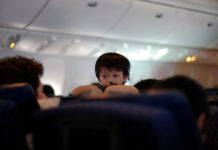Dear Dr. Gupta,
We’re a British family living in Spain. My daughter is 22 months old, at Spanish nursery about 30 hours a week where she’s been going for a year. At home we typically only speak English to her and that currently appears to be a stronger language for her but she’s recently started trying sentences and they’re often mixed—probably more than I can tell as it’s sometimes hard enough to work out what she’s saying in English. It’s not a problem as we speak Spanish too so I’m tempted to leave it, but just want to be sure if it’s for the best. As I learnt my second language at four, the separation wasn’t an issue for me and it’s my first experience of it. So should parents actively seek to separate languages, if so how, or do you accept it will change as more language skills develop?”
~ English in Spain
Dear English in Spain,
You’re right. Leave it alone. You are in an ideal situation for bilingual development and just need to relax! Your daughter knows you speak both languages, so why shouldn’t she speak them both to you?
It used to be thought that bilingual children began by confusing their languages and that they learnt to separate them when they were about four years old. Further research has shown this to be wrong. Bilingual children know that there are two systems from the beginning. They may not know the same words in one language as in the other, but the evidence is that they do their best to use the right language for the occasion. In many bilingual communities, adults use more than one language in the same sentence (this is often called ‘code-mixing’), so speaking in a mixture of languages is also appropriate in some circumstances.
This behaviour by small children is what gave early researchers the impression that children did not learn to separate the languages until they were about four years old. If you were to closely observe your daughter’s mixed sentences, you’ll find that (a) she will use words in one language when she doesn’t know the word in the language she wants to speak and (b) when she is speaking to someone who really doesn’t know Spanish, she will do her best to stick to English (and vice versa).
She’s at just the right age for trying out sentences, though at this stage there won’t be much grammar. Over the next year, you’ll see grammar coming in and the difference between her Spanish and her English will become more and more obvious. If you stay in Spain, you are likely find that Spanish becomes her strongest language, by the way, and don’t worry if she starts speaking English with a Spanish accent.

































